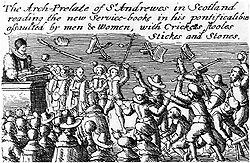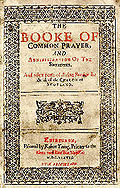
Jenny Geddes
Encyclopedia

Scottish people
The Scottish people , or Scots, are a nation and ethnic group native to Scotland. Historically they emerged from an amalgamation of the Picts and Gaels, incorporating neighbouring Britons to the south as well as invading Germanic peoples such as the Anglo-Saxons and the Norse.In modern use,...
market-trader in Edinburgh
Edinburgh
Edinburgh is the capital city of Scotland, the second largest city in Scotland, and the eighth most populous in the United Kingdom. The City of Edinburgh Council governs one of Scotland's 32 local government council areas. The council area includes urban Edinburgh and a rural area...
, who is alleged to have thrown her stool at the head of the minister in St Giles' Cathedral in objection to the first public use of the Anglican Book of Common Prayer
Book of Common Prayer
The Book of Common Prayer is the short title of a number of related prayer books used in the Anglican Communion, as well as by the Continuing Anglican, "Anglican realignment" and other Anglican churches. The original book, published in 1549 , in the reign of Edward VI, was a product of the English...
in Scotland.
The act is reputed to have sparked the riot which led to the Wars of the Three Kingdoms
Wars of the Three Kingdoms
The Wars of the Three Kingdoms formed an intertwined series of conflicts that took place in England, Ireland, and Scotland between 1639 and 1651 after these three countries had come under the "Personal Rule" of the same monarch...
, which included the English Civil War
English Civil War
The English Civil War was a series of armed conflicts and political machinations between Parliamentarians and Royalists...
.
Background

Puritan
The Puritans were a significant grouping of English Protestants in the 16th and 17th centuries. Puritanism in this sense was founded by some Marian exiles from the clergy shortly after the accession of Elizabeth I of England in 1558, as an activist movement within the Church of England...
, both in doctrine and practice. In 1633 King Charles I
Charles I of England
Charles I was King of England, King of Scotland, and King of Ireland from 27 March 1625 until his execution in 1649. Charles engaged in a struggle for power with the Parliament of England, attempting to obtain royal revenue whilst Parliament sought to curb his Royal prerogative which Charles...
came to St Giles' to have his Scottish coronation service, using the full Anglican rites, accompanied by William Laud
William Laud
William Laud was Archbishop of Canterbury from 1633 to 1645. One of the High Church Caroline divines, he opposed radical forms of Puritanism...
, his new Archbishop of Canterbury
Archbishop of Canterbury
The Archbishop of Canterbury is the senior bishop and principal leader of the Church of England, the symbolic head of the worldwide Anglican Communion, and the diocesan bishop of the Diocese of Canterbury. In his role as head of the Anglican Communion, the archbishop leads the third largest group...
. In the years that followed he began to consider ways of introducing Anglican-style church services on Scotland. The King arranged a Commission to draw up a prayer book suitable for Scotland, and in 1637 an Edinburgh printer produced:
- The BOOKE OF Common Prayer
- AND Administration Of The Sacraments:
- And other parts of divine Service
- for the use of the CHURCH OF SCOTLAND.
These developments met with widespread opposition.
The first use of the prayer book was in St Giles' on Sunday 23 July 1637, when James Hannay, Dean of Edinburgh
Edinburgh
Edinburgh is the capital city of Scotland, the second largest city in Scotland, and the eighth most populous in the United Kingdom. The City of Edinburgh Council governs one of Scotland's 32 local government council areas. The council area includes urban Edinburgh and a rural area...
, began to read the Collects, part of the prescribed service, and Jenny Geddes, a market-woman or street-seller, threw her stool straight at the Minister's head. Some sources describe it as a "fald stool" or a "creepie-stool" meaning a folding stool as shown flying towards the Dean in the illustration, while others claim that it was a larger, three-legged cuttie-stool
Cuttie-stool
A cuttie-stool, or cutty-stool , was a type of three-legged chair used in Scotland. It was a short stool, often having a round seat on the top, but the word also designates a larger piece of furniture associated with public penance in church.Such stools were often used for milking and domestic...
. As she hurled the stool she is reported to have yelled:
- "De'il gie you colic, the wame o’ ye, fause thief; daur ye say Mass in my lug?" meaning "Devil cause you severe painsColicColic is a form of pain which starts and stops abruptly. Types include:*Baby colic, a condition, usually in infants, characterized by incessant crying*Renal colic, a pain in the flank, characteristic of kidney stones...
in your abdomen, false thief: dare you say the Mass in my ear?".
This was the start of a general tumult with much of the congregation shouting abuse and throwing Bibles, stools, sticks and stones. Prebble reports the phrase "Daur ye say Mass in my lug?" as being addressed to a gentleman in the congregation who murmured a dutiful response to the liturgy, getting thumped with a Bible for his pains, and describes Jenny as one of a number of "waiting-women" who were paid to arrive early and sit on their folding stools to hold a place for their patrons. The rioters were ejected by officers summoned by the Provost
Provost (civil)
A provost is the ceremonial head of many Scottish local authorities, and under the name prévôt was a governmental position of varying importance in Ancien Regime France.-History:...
, but for the rest of the service hammered at the doors and threw stones at the windows.
More serious rioting in the streets (and in other cities) followed, and the Provost and magistrates were besieged in the City Chambers, to the extent that it became necessary to negotiate with the Edinburgh mob. At the suggestion of the Lord Advocate
Lord Advocate
Her Majesty's Advocate , known as the Lord Advocate , is the chief legal officer of the Scottish Government and the Crown in Scotland for both civil and criminal matters that fall within the devolved powers of the Scottish Parliament...
it appointed a committee known as the Tables to negotiate with the Privy Council
Privy council
A privy council is a body that advises the head of state of a nation, typically, but not always, in the context of a monarchic government. The word "privy" means "private" or "secret"; thus, a privy council was originally a committee of the monarch's closest advisors to give confidential advice on...
. Characteristically, Charles turned down the Tables' demands for withdrawal of the Anglican liturgy and more riots ensued with talk of civil war. This led to widespread signing of the National Covenant in February 1638, with its defiance of any attempt to introduce innovations like the Prayer Book that had not first been subject to the scrutiny of Parliament and the General Assembly of the Church. In November of the same year, the bishops and archbishops were formally expelled from the Church of Scotland, which was then established on a full Presbyterian basis. Charles reacted by launching the Bishops' Wars
Bishops' Wars
The Bishops' Wars , were conflicts, both political and military, which occurred in 1639 and 1640 centred around the nature of the governance of the Church of Scotland, and the rights and powers of the Crown...
, thus beginning the Wars of Three Kingdoms.
In the aftermath of the riots definitive evidence is hard to come by, and some doubt if Jenny Geddes started the fight or if she even existed, but she remains a part of Edinburgh tradition and has long had a memorial in St Giles. The sculpture which was added recently shows a three-legged cuttie-stool
Cuttie-stool
A cuttie-stool, or cutty-stool , was a type of three-legged chair used in Scotland. It was a short stool, often having a round seat on the top, but the word also designates a larger piece of furniture associated with public penance in church.Such stools were often used for milking and domestic...
rather than a folding stool.
Around 1787, Robert Burns
Robert Burns
Robert Burns was a Scottish poet and a lyricist. He is widely regarded as the national poet of Scotland, and is celebrated worldwide...
named his mare after Jenny Geddes and wrote amusingly of this faithful horse.
See also
- Religion in the United KingdomReligion in the United KingdomReligion in the United Kingdom and the states that pre-dated the UK, was dominated by forms of Christianity for over 1,400 years. Although a majority of citizens still identify with Christianity in many surveys, regular church attendance has fallen dramatically since the middle of the 20th century,...
- Book of Common OrderBook of Common Order-Genevan Book of Order:The Genevan Book of Order, sometimes called The Order of Geneva or Knox's Liturgy, is a directory for public worship in the Reformed Church of Scotland. In 1557 the Scottish Protestant lords in council enjoined the use of the English Common Prayer, i.e. the Second Book of...
- Book of Common PrayerBook of Common PrayerThe Book of Common Prayer is the short title of a number of related prayer books used in the Anglican Communion, as well as by the Continuing Anglican, "Anglican realignment" and other Anglican churches. The original book, published in 1549 , in the reign of Edward VI, was a product of the English...
- Prayer Book RebellionPrayer Book RebellionThe Prayer Book Rebellion, Prayer Book Revolt, Prayer Book Rising, Western Rising or Western Rebellion was a popular revolt in Cornwall and Devon, in 1549. In 1549 the Book of Common Prayer, presenting the theology of the English Reformation, was introduced...
in the West of England

